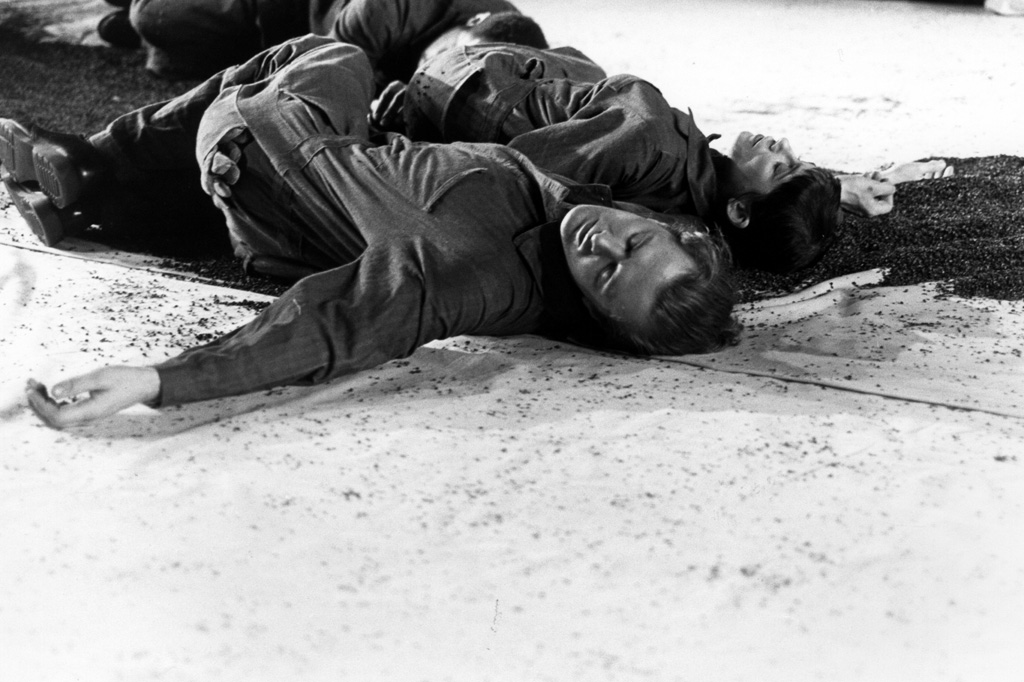Composed by Stewart Wallace
Libretto by Michael Korie
New York Premiere, 1989
Produced by Dance Theater Workshop/
Brooklyn Academy Next Wave Festival/
New Music America Festival
Directed/Choreographed by Ann Carlson
Music Direction by Joshua Rosenblum
Lighting Design by Christina Giannelli
Sound Design by John K. Erskine
Visual Design by Dee Wolff
Costume Design by Andrea Wallace
With Anny DeGange, Jerry Godfrey,
Consuelo Hill, Karen Holvik,
Lauren Mufson, Hugo Munday,
Wilbur Pauley, Michael Sokol,
Steven Tharp, Mimi Wyche
Concert Production, 1990
Three Rivers Festival, Pittsburgh
DiverseWorks/ Kaplan Theatre, Houston
Directed by Rhoda Levine
Conducted by Michael Barrett
Recorded by Koch Classics
With Evan Bowers, Jerry Godfrey
Karen Holvik, Edrie Means,
Alexandra Montano, Hugo Munday
Robert Osborne, Michael Sokol
Pamela Warrick-Smith, Randall Wong
PRESS
“Kabbalah is notable for its placement of a spiritual tradition in the foreground, shifting the focus directly toward the challenge of understanding mystical ideas experientially. Certain moments, the divine unfolding of creation, the cycle of sleep and waking, Zen-like flashes of cognition grounded in physical acts – tying shoes, dusting of surfaces, walking the roads of the Earth – and especially work’s culmination in a celebratory marriage feast – linger in mind, leaving a warm glow, like elements of a dim, deep language. Kabbalah was satisfying on many levels.”
–David Raphael Israel, Ear, Magazine of New Music, March, 1990
“An unbroken 85 minutes of rituals as ten singers act out the passage of ten souls through the ‘seven gates of spirituality.’ Mr. Wallace and Mr. Korie carried out their collaboration with apparent seriousness and sincerity. The characters sing and speak in Hebrew, English, Yiddish and Spanish, performing primordial tasks and undergoing cosmic tests – spreading earth on the ground, crossing a burning desert supporting each other – with earnest industry. Mr. Wallace’s music has a deft appeal…a production well worth seeing and a joint career well worth following.”
– John Rockwell, The New York Times, November 20, 1989
“A musical experience that approximates a religious one. The piece is an echo chamber of mystical notions. Everything is intended to resonate with religious significance, from the ten singers – the quorum of Jewish prayer and, in this case, an emblem of God’s ten mystical attributes – to the piece’s seven movements beginning at the Gate of Creation and ending at the Gate of Sabbat. The music is powerful, the libretto compelling, owing to the quality of the music and the intelligence with which the libretto has been crafted out of Jewish sources. How often is opera sung almost exclusively in Hebrew and Aramaic? Phrases float up from the writings of the 13th century mystic Abraham Abulafia, from the Talmud, the Zohar: ‘Rabbi Hiya and Rabbi Judah came to some huge mountains, in the ravines of which they found human bones left over from the generation of the flood.’ Implicit in this piece is an understanding that the modern eye, following the libretto, will tolerate the disjunction of meaning between sentences, just as the modern ear, hearing contemporary music, finds in dissonance a true echo of reality.”
–Jonathan Rosen, Forward, June 15, 1990
“Kabbalah is a lustrous and often eloquent work by Houston composer Stewat Wallace and his scholarly librettist Michael Korie. From the opening meditational chant based on the 72-letter name of the Infinite as written in Spain in the 1200s, to the closing measures in which the rabbinical voices echo the notions of reincarnation, this Kabbalah is simple in its structure, but hugely complex in its implications.”
–Ann Holmes, The Houston Chronicle, June 16, 1990
“Kabbalah concerns souls wandering in the desert, suffering, dying, and then, because they have sinned, undergoing the misfortune of rebirth. The audience is seated on two sides, with the opera between them – ten singers unroll a white floor-cloth to represent a dry riverbed. On it they dump grain, struggle, go blind… at the end, in a fabulous stroke of theatrical poetry, they all tuck themselves in under the cloth and crawl into the earth. If you didn’t know what ‘dust to dust’ meant before you saw this show, you would know afterward. As a précis of a couple of millennia in the desert, the piece moved along relatively briskly. The music was full of haunting effects: a ram’s horn, congas, voices like devils and angels.”
–Joan Acocella, 7 Days, November 29, 1989
“Clearly, this is opera only in the most postmodern sense – but it’s a rewarding foray into the more arcane side of religious tradition, through the unlikely vessel of downtown New York cool. Based on an array of texts from Jewish mysticism, Korie’s eclectic libretto blends lists and repetitive chants with snippets of narrative and theology. Wallace’s loose-limbed quasi-minimalist score is an endless storehouse of rich surprises.”
–Joshua Kosman, San Francisco Chronicle, October 6, 1991


